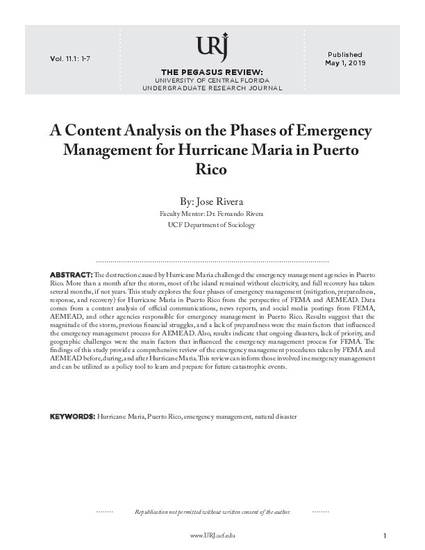
Article
A Content Analysis on the Phases of Emergency Management for Hurricane Maria in Puerto Rico
The Pegasus Review: UCF Undergraduate Research Journal
(2019)
Abstract
The destruction caused by Hurricane Maria challenged the emergency management agencies in Puerto Rico. More than a month after the storm, most of the island remained without electricity, and full recovery has taken several months, if not years. This study explores the four phases of emergency management (mitigation, preparedness, response, and recovery) for Hurricane Maria in Puerto Rico from the perspective of FEMA and AEMEAD. Data comes from a content analysis of official communications, news reports, and social media postings from FEMA, AEMEAD, and other agencies responsible for emergency management in Puerto Rico. Results suggest that the magnitude of the storm, previous financial struggles, and a lack of preparedness were the main factors that influenced the emergency management process for AEMEAD. Also, results indicate that ongoing disasters, lack of priority, and geographic challenges were the main factors that influenced the emergency management process for FEMA. The findings of this study provide a comprehensive review of the emergency management procedures taken by FEMA and AEMEAD before, during, and after Hurricane Maria. This review can inform those involved in emergency management and can be utilized as a policy tool to learn and prepare for future catastrophic events.
Keywords
- Hurricane Maria,
- Puerto Rico,
- emergency management,
- natural disaster
Disciplines
Publication Date
Summer May 1, 2019
Citation Information
Jose Rivera and Fernando I. Rivera. "A Content Analysis on the Phases of Emergency Management for Hurricane Maria in Puerto Rico" The Pegasus Review: UCF Undergraduate Research Journal (2019) Available at: http://works.bepress.com/jose-rivera/2/
